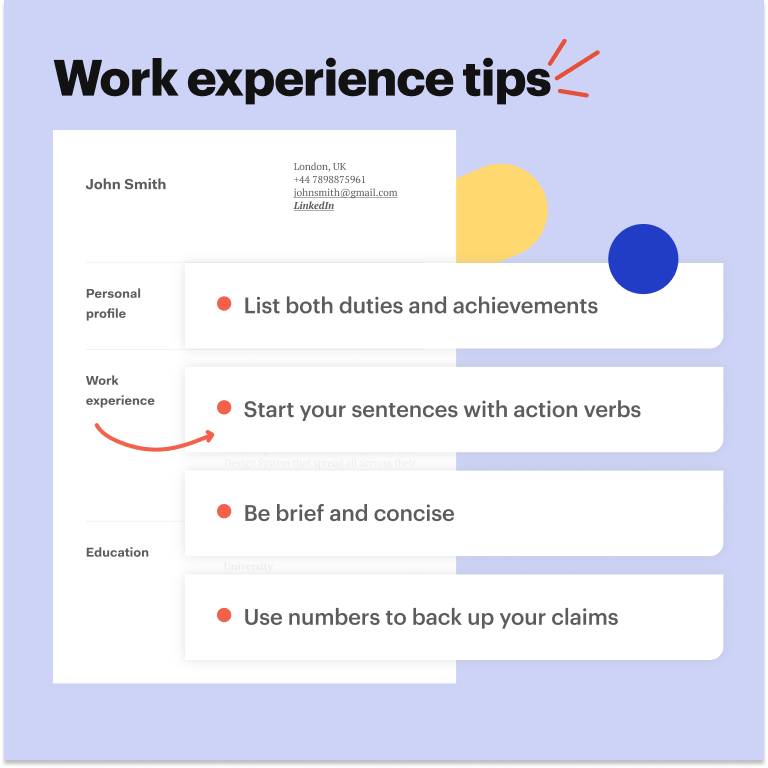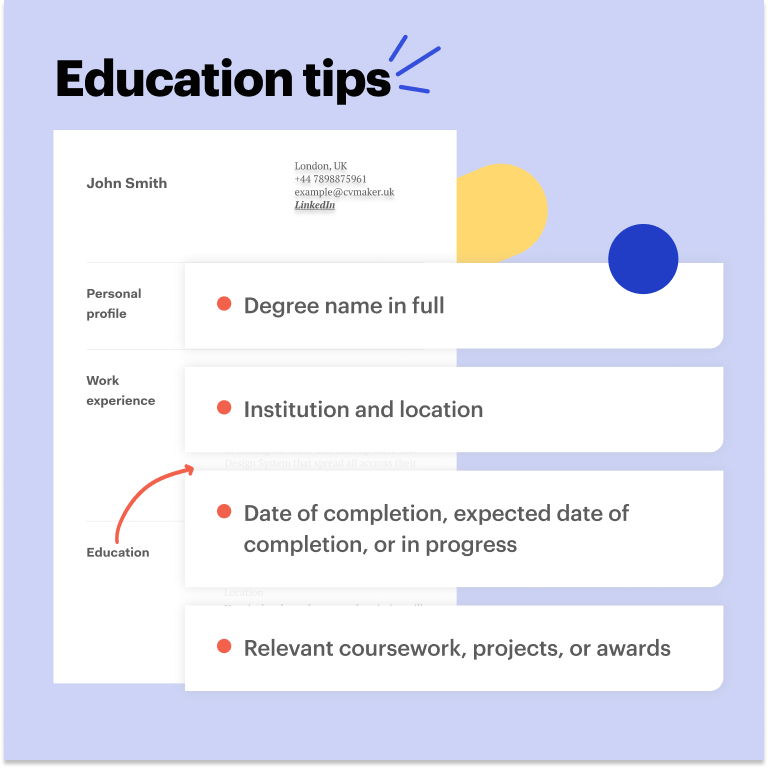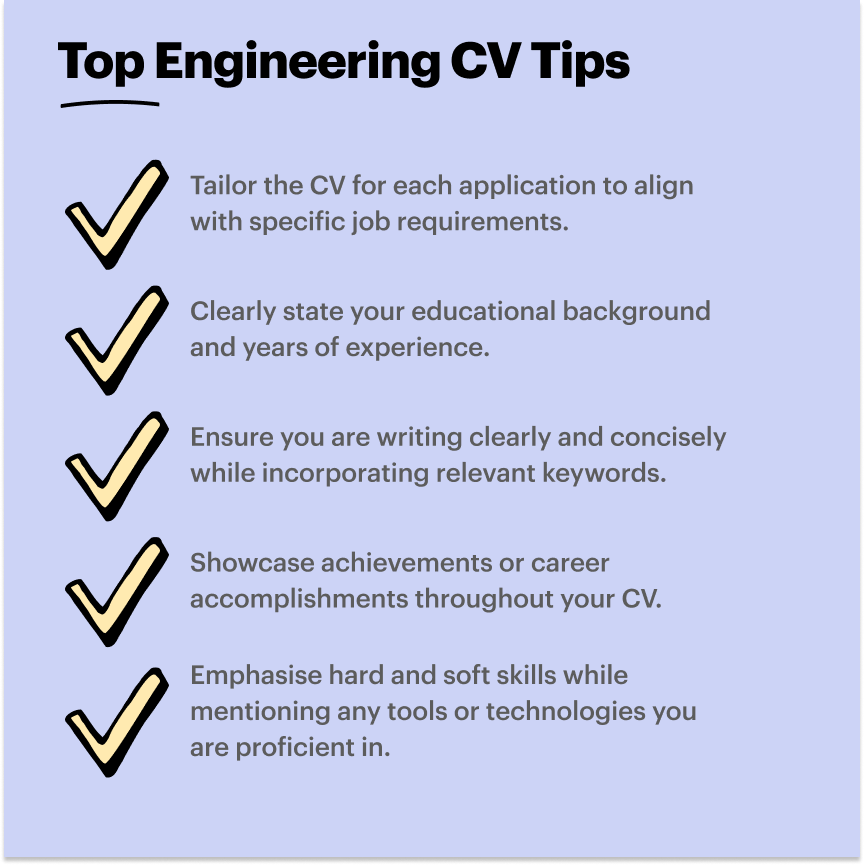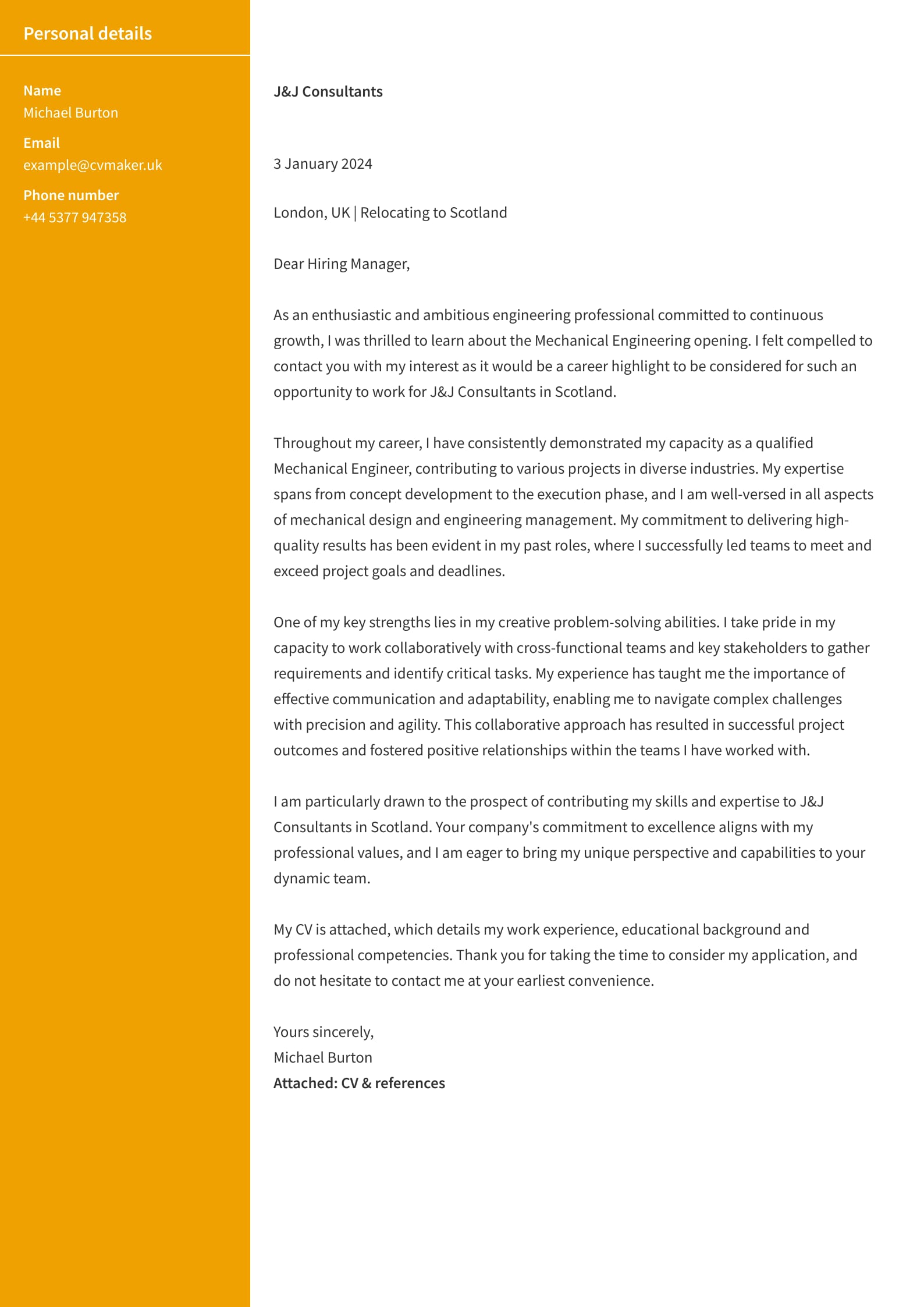
How to Write an Engineering CV (Guide, Example, and Tips)
If you enjoy solving real-world problems, then a career in engineering might be for you. Whether you are experienced or just starting your career, this CV writing guide provides insight into how to write an engineering CV and industry-standard tips to help you land more interviews.
Engineering is a broad-scope profession. Refer to these CV examples and writing guides for more job-specific roles.
The end goal is to strike a balance between providing enough detail to demonstrate your proficiency while ensuring your CV remains concise, applicant tracking system (ATS) friendly, and tailored to your career goals. This article offers a comprehensive guide to creating a modern CV showcasing your expertise and experience. So, if you're ready to learn how to write a good engineering CV, let's get started!

Engineer CV Example

Download this engineering CV example in PDF
Michael is an experienced Engineer with five years of experience solving complex, real-world problems with innovative engineering designs. He is a creative problem solver seeking a new challenge. Michael has opted for the Stanford template, a clean, modern engineering CV.

Refer to the matching engineering cover letter to accompany your CV!
What to include in an engineer CV?
Every engineer understands the importance of a plan. Regardless of the scope or size of a project, the best engineers take time to analyse the objectives, goals, hurdles, budgets, and every variable before starting. Fortunately, writing a good CV is relatively straightforward. Key sections include:

The truth is that the project's size or scope is irrelevant when creating your CV structure. The engineering CV example above showcases the primary sections you'll include with any speciality.
Pro Tip
When tailoring your CV to a specific role, refer to your existing research or conduct new research on a position of interest to ensure you are using the correct keywords and skills that are both relevant and accurate.
Specify your engineering career goals in a personal profile
A good personal profile contains your title, experience, career goals, and soft skills pertinent to the jobs you are targeting. It’s an excellent opportunity to provide further details that might grab the reader's attention and pass ATS. Learn more by reading how to write a personal profile.

Mechanical engineer CV personal profile example
Dedicated Mechanical Engineer with 10 years of experience in designing and implementing innovative solutions. Strong technical background and expertise in CAD modelling, stress analysis, and materials science. Adept at collaborating with cross-functional teams to optimise product performance and efficiency.
Civil engineer CV personal profile example
Results-driven Civil Engineer with 5 years of extensive experience in managing and executing complex construction projects. Proficient in project planning, cost estimation, and resource allocation. Skilled in using AutoCAD and other design software to create accurate blueprints. Excellent communication and interpersonal skills, fostering effective collaboration with project stakeholders.
Electrical engineer CV personal profile example
Innovative Electrical Engineering professional with 5+ years of proven success in designing and implementing electrical systems. Experienced in power distribution, control systems, and automation. Proficient in using tools such as MATLAB and PLC programming. Adept at troubleshooting and resolving complex electrical issues.
Industrial engineer CV personal profile example
Detail-oriented Industrial Engineer with a background in process ooptimisationand efficiency improvement. Skilled in analysing and redesigning workflows to enhance productivity. Proficient in utilising tools such as Six Sigma and Lean methodologies. Excellent project management and communication skills, enabling effective coordination with cross-functional teams.
Chemical engineer CV personal profile example
Dynamic Chemical Engineer with a strong foundation in chemical processes and production. Experienced in process design, optimisation, and quality control. Proficient in utilising simulation software for process modelling. Strong analytical and problem-solving skills, coupled with a commitment to safety and environmental sustainability.
Graduate engineer personal profile example
Recent graduate with a Master of Engineering in Mechanical Design and Engineering Management. Swift learner, adept in cultivating positive relationships and known for solid team collaborations while consistently delivering on time and upholding high-quality control standards.
If you're opting for a more technical approach, consult the following examples of CVs:
Mention relevant engineering skills
An engineer can have many personality traits, but something that is shared amongst them includes technical and analytical abilities, attention to detail, and an insatiable curiosity to make a difference.
When it comes to adding skills, it is quite straightforward. Skills on a CV should be balanced between hard, soft, and transferable skills. In some cases, for engineering, you will need to elaborate on technical skills such as software and tools.

Examples of hard skills:
Agile Project management
Site management
Structural analysis.
Examples of soft skills:
Problem-solving
Critical thinking
Attention to detail.
Examples of transferable skills:
Analytical skills
Adaptability
Interviewing.
Examples of technical skills:
SolidWorks
AutoCAD
MATLAB.
For more engineering skills examples, refer to our civil engineer CV example.
Work experience on an engineering CV
The employment history should match what you've stated in your application. This is to ensure uniformity, which leads to honesty and transparency. We propose listing your most recent projects relevant to your desired role.
Mechanical Engineer, Precision Dynamics Engineering, London | 2019 - 2023
Led mechanical engineering projects, optimising efficiency and minimising operational risks. Conducted comprehensive analyses of mechanical systems, identifying areas for improvement and implementing precise engineering solutions. Collaborated with cross-functional teams to evaluate project feasibility and provided regular updates to senior management.
Implemented innovative design solutions, resulting in a 15% reduction in production costs and a 20% increase in overall project efficiency.
Developed and executed precision manufacturing processes, achieving a 98% success rate in meeting quality standards and reducing defects by 15%.
Entry-Level Civil Engineer, University of London | 2023
Engaged in collaborative problem-solving sessions, contributing ideas, and learning from experienced team members to address engineering challenges.Utilised Computer-Aided Design (CAD) software to create detailed 3D models and technical drawings, facilitating effective communication within the engineering team.
Presented findings at the university's annual engineering symposium, earning recognition for innovative insights and contributing to ongoing discussions on sustainable engineering practices.
Received commendation for demonstrating a strong work ethic, adaptability, and the ability to contribute effectively to a professional engineering team during summer internship at ABC Engineering Solutions.
Refer to how to write work experience on a CV for more tips or check out key tips below:

Refer to our tips on how to write a CV with no experience if you are changing careers or lack work experience.
Mention engineering education and qualifications
While many job seekers believe that they should list their educational history from elementary to doctorate degree, the fact is that employers simply care about the highest level of study completed. Refer to how to list education on a CV for more tips.

However, to become a qualified engineer in the UK, you must complete a bachelor's degree and preferably honours from an accredited university. Refer to our skills-based CV example or graduate article if you have little to no experience.
For further insights refer to the following CV examples:
Boost your engineering CV with courses and certificates
This section varies depending on the type of position you're targeting. Most jobs will not require a specific certification or licence. However, certifications in some specialities help gain a competitive advantage. Some of the critical certifications you may want to list on your CV include:
Level 3 Engineering, City & Guilds
Level 2 Certificate in Engineering Operations, City & Guilds
PMI Agile Certified Practitioner (PMI-ACP)
CompTIA Security+
ASQ Certified Quality Engineer (CQE).
See the courses and certificates article for more information about the difference between courses, certifications, licenses, or professional training.
Key takeaways
With insight into what makes a good engineering CV and the importance of tailoring your CV to a specific job, you are already one step ahead of the competition. As an engineer, you've trained hard to devise practical solutions to problems by following an established process.

Next steps?
To ensure that your CV accurately represents your qualifications and experiences, explore our array of products and services:
Cover letter template: enhance your application with a corresponding cover letter template designed with a clean format.
CV Writing Service: collaborate with our skilled professionals for personalised feedback and expert guidance in tailoring your CV for a specific job.
Career blog: explore our comprehensive guides and articles to educate yourself on the most effective strategies for enhancing your job prospects.
Investing time in refining your CV can increase your chances of securing that crucial job interview or advancing into a more senior role. Additionally, see our related blog article about highest-paying jobs in the UK for more details on salaries and requirements for engineers.
FAQs
How do you describe yourself as an engineer on a CV?
Highlight your key engineering skills, expertise, and experiences that are required for the specific role. If relevant, emphasise technical proficiency, problem-solving abilities, and any notable achievements.
What CV format is best for engineers?
The reverse-chronological format is commonly preferred for engineering CVs. This format focuses on your work experience, showcasing your career progression and achievements. However, if you are an engineering graduate, refer to the skills-based layout mentioned in the education section above.
What is the main objective of an engineering CV?
To showcase relevant engineering skills, key qualities, experience, and qualifications to potential employers. It should demonstrate your ability to contribute to projects, solve problems, or add value to the organisation.




